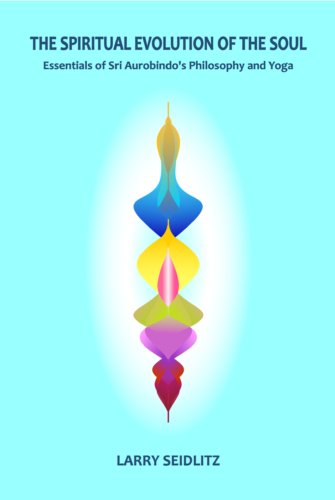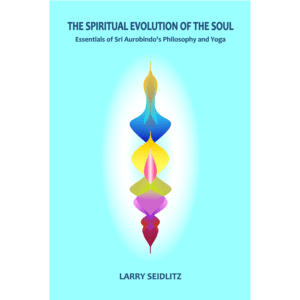The Spiritual Evolution of the Soul by Larry Seidlitz

The Spiritual Evolution of the Soul
Essentials of Sri Aurobindo’s Philosophy and Yoga
This book provides a concise and detailed summary of Sri Aurobindo’s philosophy and yoga while focusing on one of its main themes: the spiritual evolution of the soul. It covers essential ideas in the philosophy such as the nature of the Divine and its relation to the universe, the processes of involution and evolution, the relation of the soul and nature, the processes of karma and rebirth, the evolution of societies, the main principles and practices of the Integral Yoga, the psychic, spiritual, and supramental transformations of consciousness, and the concept and realization of the superman, the intermediary between the human and the supramental being. It concludes with a consideration of the validity and relevance of the philosophy and yoga for contemporary life.
Larry Seidlitz, Ph.D. is a practitioner and scholar of the Integral Yoga. This is his third book on Sri Aurobindo’s philosophy and yoga, and he has also written essays on the topic for various journals. He was editor of the USA-based journal on the Integral Yoga Collaboration for 16 years, edits books and papers for other scholars on the Yoga, and conducts online courses on the Yoga for the Sri Aurobindo Centre for Advanced Research. Formerly a research psychologist in the USA, he now resides near Auroville and is associated with both the Sri Aurobindo Ashram and Auroville.
Author: Larry Seidlitz
Print Length: 219 pages
Publisher: Indian Psychology Institute
Book format: PDF, ePub, Kindle
Language: English
Book Download
Table of Contents
- Chapter 1. Introduction and Overview
- Chapter 2. The Divine and the Undivine
- Chapter 3. Involution and Evolution
- Chapter 4. The Soul and Nature
- Chapter 5. Karma and Rebirth
- Chapter 6. The Evolution of Human Societies
- Chapter 7. Integral Yoga as Concentrated Evolution
- Chapter 8. The Triple Transformation
- Chapter 9. The Superman: Intermediary Between the Human and Supramental Being
- Chapter 10. The Relevance of Sri Aurobindo’s Philosophy and Yoga
- Glossary
Book Sample
The Spiritual Evolution of the Soul
There are times when we may wonder at this world in which we find ourselves—this beauty and ugliness, the marvels of human ingenuity and the abysms of its obstinate ignorance and stupidity, the goodness and kindness of people and their ability for malignancy, hatred, and cruelty, the exquisite harmonies of nature and its violent and wholesale destructiveness. We are born and slowly awake to this buzzing confusion of life in and around us and try with our limited but growing capacities to make sense of it and establish some semblance of security and a degree of control over the limited sphere of our own lives in the midst of this treacherous and amazing world. How has this existence come into being? It seems to swirl in an eternal vastness of dark, empty space populated sparsely by cataclysms of nuclear fire. Is it by chance that somewhere in this infinite space and time our world formed and life emerged and human beings evolved with a mind to look out at all this and wonder and speculate? Or is there some intelligent design and purpose behind these predictable interactions of protons and electrons and neutrinos, the interactions of living cells and microorganisms, the ecological balance among the plants and animals and people and earth and sky? We seem to be carried forward in the flood of life through childhood, education, young adulthood, romance, marriage, work, development of abilities and talents, production, ease and enjoyment, disease and death. Is there any purpose to our life? Is it the flash of a firefly in the night? Is there a life after death? Do we have a soul that survives death, that continues to flow ahead in the force of the flood? What is this mind that asks these questions, that looks at itself and the world, that searches for answers, that looks for meaning? Is it a chance excitation of electrons in our brain? Could it derive from some intelligence that devised the universe? From where comes this tendency in human beings to organize and improve their individual and common lives, to create a harmonious existence and coexistence, to strive for order and balance and equity, to design and create beauty? What are we to make of the human pursuit and celebration of love, truth, strength, honor, and goodness? Where do these things come from and why do they play such an important and valued part of human life? Did they develop in the natural physical evolution of our bodies to help us survive and reproduce? Or might they be reflections, expressions of the original intelligence and its powers at the origin of all things?
The philosophy presented in this book provides answers to these questions. It represents my understanding of the teachings of my spiritual teachers Sri Aurobindo and the Mother about the human being and its evolutionary journey toward a divine life on earth. I came across these teachings 44 years ago, found them convincing, and have been studying them and doing my best to practice them ever since. Over these many years, my studies, my own inner experiences, and my discussions with others who have followed their teachings have further confirmed my convictions. I find the philosophy to be extraordinarily positive and inspiring, and while I understand that many would be skeptical of such an idealistic philosophy in our troubled times, it is congruent both among its parts and with other widely accepted narratives about the nature of human beings and our world. In the lengthy exposition of his philosophy in the book The Life Divine, Sri Aurobindo provided extensive rational arguments to support his views, and explained them in the context of competing views of existence, especially materialistic science and an alternative Indian spiritual view that regards the universe as an illusion and proposes a departure from this illusory existence into a spiritual Reality that is unrelated to it. In order to provide a more simplified and streamlined explanation of the main points of the philosophy, I have for the most part omitted Sri Aurobindo’s rational arguments for it and his refutation of competing viewpoints. In the end, I think it is impossible to rationally prove the superiority of one or another of these alternative philosophies, and that in any case our faith, intuitions, and mental preconceptions tend to settle these kinds of matters for us. Nevertheless, for those who are interested, a strong rational defense of the philosophy may be found in The Life Divine, in his Letters on Yoga, and in some of Sri Aurobindo’s other works.
…


Leave a Reply
Want to join the discussion?Feel free to contribute!